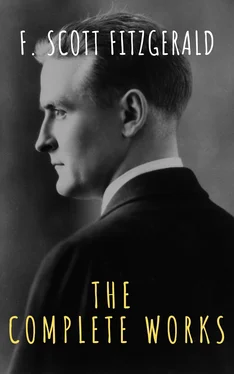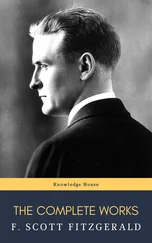“Eleanor,” he demanded, “why is it that everyone looks so—well, so loose—so socially slovenly?”
“It’s terribly obvious, isn’t it?” she agreed, following his eyes around the room.
“And no one seems to care,” he continued.
“No one does,” she responded, “but, my dear man, we can’t sit here and criticize our hosts. What about me? How do I look?”
He regarded her critically.
“I’d say on the whole that you’ve kept your looks.”
“Well, I like that.” She raised her brows at him in reproof. “You talk as if I were some shelved, old play-about, just over some domestic catastrophe.”
There was a pause; then he asked her directly.
“How about Dick?”
She grew serious at once.
“Poor Dick—I suppose we were engaged.”
“Suppose!” he said, astonished. “Why it was understood by everyone. Both our families knew. I know I used to lie awake and envy my lucky brother.”
She laughed.
“Well, we certainly thought ourselves engaged. If war hadn’t come we’d be comfortably married now, but if he were still alive under these circumstances, I doubt if we’d be even engaged.”
“You weren’t in love with him?”
“Well, you see, perhaps that wouldn’t be the question, perhaps he wouldn’t marry me and perhaps I couldn’t marry him.”
He jumped to his feet, astounded, and her warning hush just prevented him from exclaiming aloud. Before he could control his voice enough to speak she had whisked off with a staff officer. What could she mean?—except that in some moment of emotional excitement she had—but he couldn’t bear to think of Eleanor in that light. He must have misunderstood—he must talk more with her. No, surely—if it had been true she wouldn’t have said it so casually. He watched her—how close she danced. Her bright brown hair lay against the staff officer’s shoulder, and her vivacious face was only two or three inches from his when she talked. All things considered Clay was becoming more angry every minute with things in general.
Next time he danced with her she seized his arm, and before he knew her intention, they had said good-byes to the Severances and were speeding away in Eleanor’s limousine.
“It’s a nineteen-thirteen car—imagine having a four-year-old limousine before the war.”
“Terrific privation,” he said ironically. “Eleanor, I want to speak to you—”
“And I to you. That’s why I took you away. Where are you living?”
“At home.”
“Well then we’ll go to your old rooms in Grove Street. You’ve still got them, haven’t you?”
Before he could answer she had spoken to the chauffeur and was leaning back in the corner smiling at him.
“Why Eleanor, we can’t do that—talk there—”
“Are the rooms cleaned?” she interrupted.
“About once a month I think, but—”
“That’s all that’s necessary. In fact it’ll be wonderfully proper, won’t be clothes lying around the room as there usually are at bachelor teas. At Colonel Hotesane’s farewell party, Gertrude Evarts and I saw—in the middle of the floor, well, my dear, a series of garments and—as we were the first to arrive we—”
“Eleanor,” said Clay firmly. “I don’t like this.”
“I know you don’t, and that’s why we’re going to your rooms to talk it over. Good heavens, do you think people worry these days about where conversations take place, unless they’re in wireless towers, or shoreways in coast towns?”
The machine had stopped and before he could bring further argument to bear she had stepped out and scurried up the steps, where she announced that she would wait until he came and opened the door. He had no alternative. He followed, and as they mounted the stairs inside he could hear her laughing softly at him in the darkness.
He threw open the door and groped for the electric light, and in the glow that followed both stood without moving. There on the table sat a picture of Dick. Dick almost as they had last seen him, worldly wise and sophisticated, in his civilian clothes. Eleanor was the first to move. She crossed swiftly over, the dust rising with the swish of her silk, and elbows on the table said softly:
“Poor old handsome, with your beautiful self all smashed.” She turned to Clay: “Dick didn’t have much of a soul, such a small soul. He never bothered about eternity and I doubt if he knows any—but he had a way with him, and oh, that magnificent body of his, red gold hair, brown eyes—” her voice trailed off and she sank lazily onto the sofa in front of the hearth.
“Build a fire and then come and put your arm around me and we’ll talk.” Obediently he searched for wood while she sat and chatted. “I won’t pretend to busybody around and try to help—I’m far too tired. I’m sure I can give the impression of home much better by just sitting here and talking, can’t I?”
He looked up from where he knelt at her feet, manipulating the kerosene can, and realized that his voice was husky as he spoke.
“Just talk about England—about the country a little and about Scotland and tell me things that have happened, amusing provincial things and things with women in them—Put yourself in,” he finished rather abruptly.
Eleanor smiled and kneeling down beside him lit the match and ran it along the edge of the paper that undermined the logs. She twisted her head to read it as it curled up in black at the corners. “August 14th, 1915. Zeppelin raid in—there it goes,” as it disappeared in little licking flames. “My little sister—you remember Katherine: Kitty, the one with the yellow hair and the little lisp—she was killed by one of those things—she and a governess, that summer.”
“Little Kitty,” he said sadly. “A lot of children were killed I know, a lot. I didn’t know she was gone.” He was far away now and a set look had come into his eyes. She hastened to change the subject.
“Lots—but we’re not on death tonight. We’re going to pretend we’re happy. Do you see?” She patted his knee reprovingly. “We are happy. We are ! Why you were almost whimsical a while ago. I believe you’re a sentimentalist. Are you?”
He was still gazing absently at the fire but he looked up at this.
“Tonight, I am—almost—for the first time in my life. Are you, Eleanor?”
“No. I’m romantic. There’s a huge difference. A sentimental person thinks things will last; a romantic person hopes they won’t.”
He was in a reverie again and she knew that he had hardly heard her.
“Excuse please,” she pleaded, slipping close to him. “Do be a nice boy and put your arm around me.” He put his arm gingerly about her until she began to laugh quietly. Then he hastily withdrew it and, bending forward, talked quickly at the fire.
“Will you tell me why in the name of this mad world we’re here tonight? Do you realize that this is—was a bachelor apartment before the bachelors all married the red widow over the channel—and you’ll be compromised?”
She seized the straps of his shoulder belt and tugged at him until his grey eyes looked into hers.
“Clay, Clay, don’t—you musn’t use small petty words like that at this time. Compromise! What’s that to words like Life and Love and Death and England. Compromise! Clay I don’t believe anyone uses that word except servants.” She laughed. “Clay, you and our butler are the only men in England who use the word compromise. My maid and I have been warned within a week—How odd—Clay, look at me.”
He looked at her and saw what she intended, beauty heightened by enthusiasm. Her lips were half parted in a smile, her hair just so slightly disarranged.
“Damned witch,” he muttered. “You used to read Tolstoy, and believe him.”
Читать дальше












